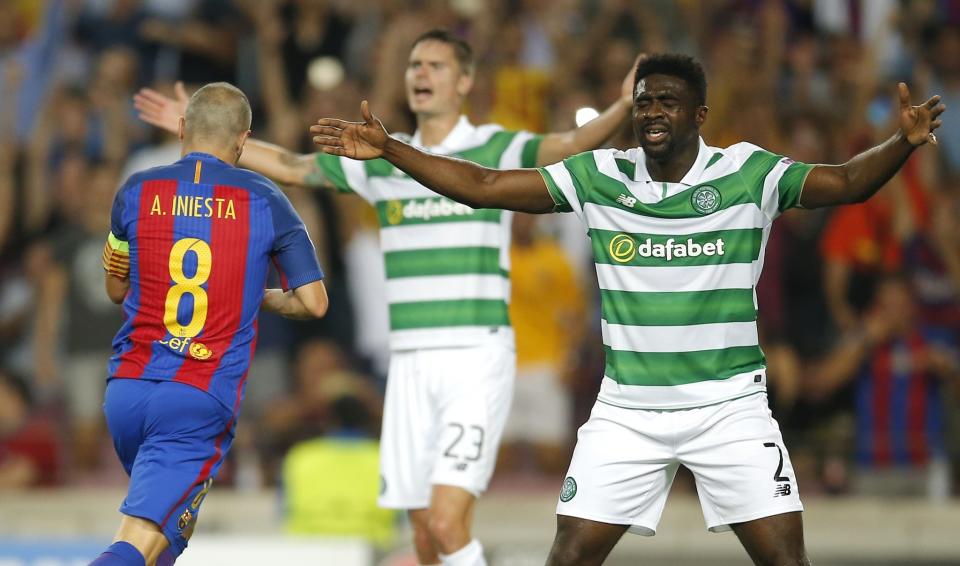The UEFA Champions League has one gigantic problem

The Champions League has a predictability problem.
This season, the whole ordeal will drag on from June 28 through June 24 – the very first day of qualifying until the big final next year at the Millennium Stadium in Cardiff. The main tournament itself will last almost 10 months. After 92 qualifiers, the 32 teams that reached the group stage will play 125 matches to decide a European champion.
[ FC Yahoo: Follow the action of Champions League Matchday 2 ]
Yet long before well over 200 games have been played, we already kind of know the outcome. Which is to say, we know more or less who will be in the semifinals. Because in the last 10 years, just 15 clubs have made it to the final four of Europe’s elite continental tournament. In the last five years, just eight have.
In the last half decade, Real Madrid, Bayern Munich and either Barcelona or Atletico Madrid have been in the semifinals every single year. Every. Single. Year.
Barca, in fact, has reached the semis seven times in the last 10 years, including a six-year streak. Real is currently on just such a six-year run. Bayern has made it five years in a row and six in 10. Chelsea has made it that far in half of the last 10 seasons. Manchester United made it four times in five years, albeit not since 2010-11.
There is no great intrigue about this tournament.
Well, that isn’t entirely fair. Nine more teams that never reached the semis did make the quarterfinals in the last five years. The field, in other words, isn’t whittled down to its true elite until the last five games, at which point the whole thing becomes a sort of soccer version of the Bill Murray movie “Groundhog Day.” But that it gets there at all is problematic. Because it makes the entire thing feel preordained and inevitable, and that kind of defeats the point of sports.
The group stage has practically become a fait accompli before anything is actually done or accomplished. It’s essentially been rendered a formality, with the advancement of the teams that will ultimately determine the winner amongst themselves pretty much a given. And considering that it takes the entire fall, and a few days of summer, to get through the group stage, it’s become a big ask for the fan to invest that kind of time watching something that will yield very few surprises.
Consider the scores of the first matchday of group-stage games as this new season kicked off. There was nothing at all surprising in it, and some of the big clubs won so big – Barcelona 7-0 Celtic; Bayern 5-0 Rostov; Manchester City 4-0 Borussia Moenchengladbach; Legia Warsaw 0-6 Borussia Dortmund – as to make those games look a little sad. The only game that came close to being an upset, when Sporting Lisbon held a 1-0 lead over defending champion Real Madrid until the last few minutes, was overturned when Real scored in the 89th and 95th minutes to win anyway.
The chasm between the have-endless-moneys and the have-a-fair-amounts is only looking like it will grow larger. It will be institutionalized by the new arrangement between UEFA and its most powerful clubs, hastily brokered before Aleksander Ceferin was installed as the European governing body’s new president. The four biggest leagues – England, Spain, Germany, and Italy – will each be guaranteed four spots in the group stage, rather than three and one in the qualifying rounds or two and one qualifier.
This ensures that the same teams are more likely to return, even if they have a down season in their domestic leagues and place a little lower than usual. It cements the status quo of the mega-club oligarchy.
The arrangement was strong-armed into existence by the clubs in return for their vow not to break away and create a “super league.” This concept has lingered in the background for more than a decade. It would be some kind of breakaway European competition featuring the biggest clubs on the continent, regardless of their domestic placement, which would see them keep far more of the proceeds. Ceferin has vowed to re-examine the new rules, as they do indeed make soccer’s biggest annual competition anti-competitive, with half of the places set aside for four out of the confederation’s 55 leagues.
Judging by Cerferin’s grandstanding talk of showing the clubs who’s boss, he doesn’t yet seem to realize that it certainly isn’t him, since UEFA needs its clubs far more than they need the replaceable and profit-sucking institution. The new president is unlikely to forge a better deal. Especially now that the precedent has already been set.
And so the Champions League’s monotone drumbeat of largely unremarkable games will probably just drone on. There is little the new Slovenian grand poohbah of European soccer can do about it. And, besides, some kind of single-table league format for a Super League surely wouldn’t have fixed the problem, even if it had concluded in playoffs. The legacy clubs would still dominate it. As even the nouveaux-riches Chelsea, City and Paris-Saint Germain haven’t been able to consistently compete the way the old-money clubs have. Sure, Chelsea won the Champions League in 2012, but if we’re being honest that was a bit of a fluke in a strange season.
The truth is, once the semifinals roll around, the Champions League games are consistently scintillating. And every so often you get a good matchup a round or two before that point. But most of the games until then are forgettable. That’s a problem. Because what happens if people eventually grow tired of watching the same teams decide the title again and again?
Leander Schaerlaeckens is a soccer columnist for Yahoo Sports. Follow him on Twitter @LeanderAlphabet.

 Yahoo Sports
Yahoo Sports 

